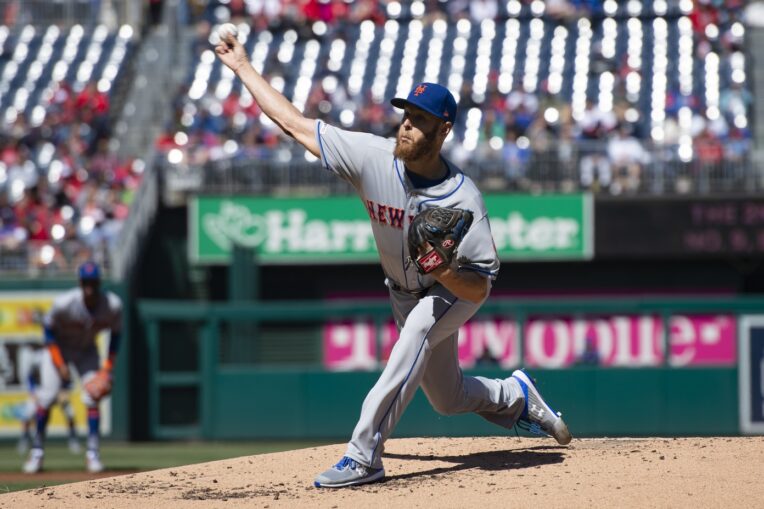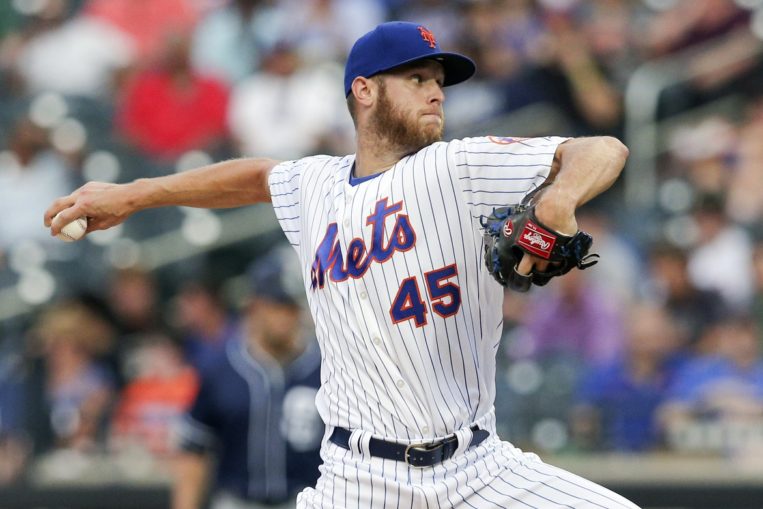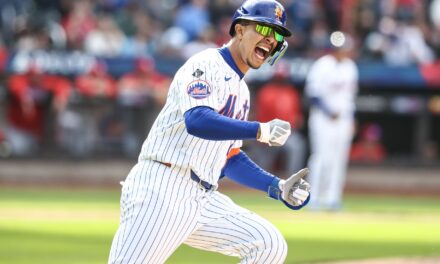
When New York Mets general manager Sandy Alderson acquired Zack Wheeler — a young, extremely promising right-handed prospect — for soon-to-be free agent Carlos Beltran just ahead of the 2011 trade deadline, most deemed it a win for the franchise.
Beltran’s time in New York was generally prosperous, but his time here had run its course. Plus, the Mets apparently couldn’t resist the idea of one day seeing Wheeler alongside the Mets’ top draft pick in 2010, a right-handed senior from the University of North Carolina, Matt Harvey, and their 2009 second-round pick, left-handed Long Island product, Steven Matz.
That dream began in earnest on June 18, 2013, when, at Atlanta (Wheeler is a native of Smyrna, Georgia), Wheeler made his MLB debut in the nightcap of a twin-bill versus the Braves, with Harvey — midway through his legendary 2013 campaign — starting the first game, forever known to Mets fans as ‘Super Tuesday’.
Wheeler’s six scoreless innings of work that evening spoke volumes regarding the then-23-year-old’s talent level (his 2013 four-seamer popped just like the 2019 version) and, despite walking five batters in his debut (we’ll chalk that up to nerves), his 3.42 ERA over 17 starts that season attached an all-too-familiar level of excitement for a young Mets pitcher.
The young fireballer’s progress continued at an impressive pace in 2014, with Wheeler putting up a 3.54 ERA over 32 starts (185.1 innings) with 187 strikeouts. Naturally, that aforementioned level of excitement increased tenfold. That is, until the next spring.
On March 20, 2015, the team announced that Zack Wheeler would undergo season-ending surgery to repair the torn ulnar collateral ligament in his right elbow. Not only would Wheeler’s 2015 campaign be wiped out, but he was also expected to be sidelined through at least June of the 2016 season.
While rehabbing from Tommy John surgery, Wheeler was nearly traded to the Brewers at the 2015 trade deadline in the now-infamous non-deal that would have brought Carlos Gomez to Flushing in exchange for the injured righty and a young infielder with a penchant for hitting lefties, Wilmer Flores.
Wheeler’s phone call to Alderson once whispers of a deal became louder, directly requesting to remain with the Mets, most likely kept him in orange and blue. It was either that or the rumored availability of Yoenis Cespedes and the Detroit Tigers’ affinity for right-hander Michael Fulmer. We’ll likely never know (wink).
With that episode behind him, Wheeler continued on his path back to the majors. Unfortunately, his journey would be sidetracked yet again.

In late June 2016, while on a rehab assignment with Advanced-A St. Lucie, Wheeler felt discomfort in his throwing elbow and, after deliberation within the organization, it was decided Wheeler would be shut down for the rest of the season.
Once 2017 rolled around, the consensus on Wheeler was a mixed bag. Some pointed to his pre-surgery trajectory and saw the potential. Others would need to see Wheeler’s post-TJS resurgence to believe it.
Challenge accepted, but not without speedbumps. Wheels made 17 starts in 2017, racking up a 2.41 ERA over seven starts from April 29 through June 7, before seeing his production drop off. By the end of July, Wheeler was back on the injured list with what was diagnosed as a stress reaction in his surgically-repaired right elbow.
The dejected sigh let out from Mets fans in Flushing and its surrounding areas was likely audible in Smyrna. So, back to the drawing board, Zack went.
More rehabbing, bone-strengthening injections administered directly into his abdominal muscles (ouch), and a vow to make 30 starts in 2018 brought Wheeler back to Citi Field on a mission.
With a new friend by his side in an absolutely nasty split-fingered fastball and a renewed zip on his fastball, Zack Wheeler made meager progress before busting out in a considerable way. Heading into the second half of the 2018 season with a 4.44 ERA over 18 starts, Wheeler went on one of the more improbably dominant runs this franchise has ever seen.

Over his last 11 starts of the season, Zack Wheeler pitched to a 1.68 ERA (second in NL) with 73 strikeouts, 15 walks, and an MLB-leading 0.81 WHIP. Though he fell one start shy of his preseason goal, Zack Wheeler announced, with gusto, to anyone who would listen — he was back.
Surrounded by one of the more intimidating rotations in the majors heading in the 2019 season — Wheeler’s last under contract with the Mets — hopes were high across the board.
Despite inconsistencies this year, as well as the Mets’ own inability to find an even keel, Second-Half Zack returned for an encore. Over 11 post-ASG starts heading into his season — and possibly franchise — finale on Thursday night at Citi Field, Wheeler had a 2.77 ERA with 55 strikeouts.
Three earned runs over eight innings with 10 strikeouts and no walks, regardless of the state of affairs when he left the game or the outcome, is quite the sendoff. After it was all said and done, Wheeler finally hit that 30-start plateau he’d been willing himself to return to, and did it with a 3.96 ERA, to boot.
Heading into free agency, there will be no shortage of options for the 29-year-old. The Mets would be silly not to extend a qualifying offer, but there’s no guarantee Wheeler would accept it. He’s expressed his interest in testing the market this winter, and most wouldn’t blame him for doing so.
A 3.77 ERA over 126 career starts, with or without taking into account the mountains of adversity he’s faced along the way, is nothing to scoff at. On the contrary, there’s a lot to be proud of there.
In any case, no matter what’s next for Zack Wheeler, he’s always going to have a rabid fan base around these parts. He’s a fighter, and this town loves a fighter.
















